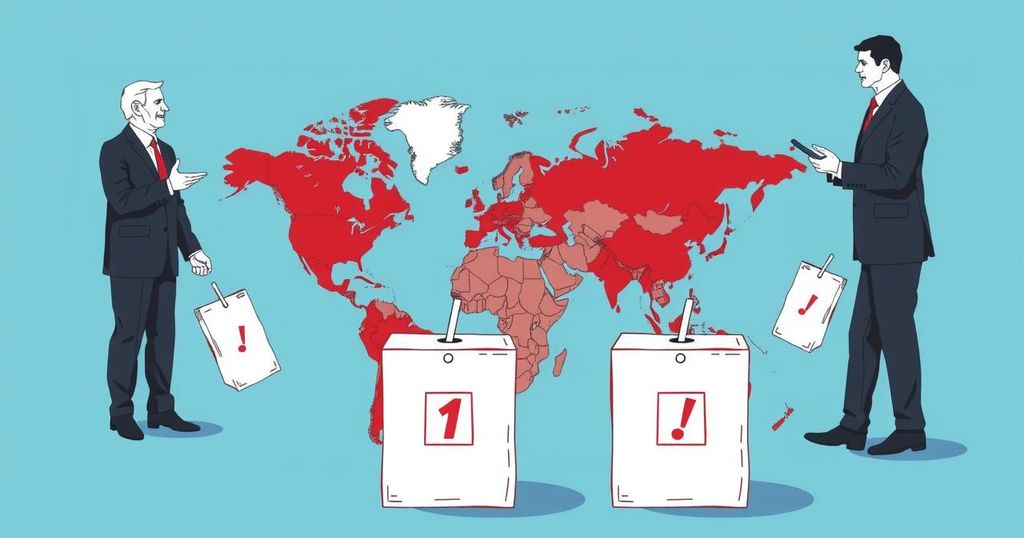2024 Elections Witness Historic Anti-Incumbent Sentiment Globally
In 2024, over 70 national elections were conducted worldwide, resulting in many incumbents being ousted due to widespread voter dissatisfaction. More than 1.6 billion ballots were cast. Significant electoral shifts occurred across political boundaries, with both conservative and liberal parties gaining ground against the prevailing incumbents. Economic dissatisfaction and distrust in democratic processes emerged as primary drivers of this trend, setting the stage for future elections in 2025.
The year 2024 marked a significant turning point in global politics with over 70 national elections conducted worldwide, resulting in a seismic shift in which many incumbent parties were ousted. Notable democratic nations including India, the United States, Indonesia, and Bangladesh participated alongside 27 European countries electing representatives to the European Parliament. According to the International Institute for Democracy and Electoral Assistance, more than 1.6 billion ballots were cast during these elections.
The overwhelming trend revealed that incumbent parties in developed nations experienced a decline in their vote shares, with a historic shift recorded after nearly 120 years of data from the ParlGov database. Compellingly, over 80% of the world’s democracies saw incumbent parties losing votes or seats, highlighting widespread discontent with the status quo across the political spectrum. In various jurisdictions, conservatives and left-leaning parties alike secured victories, showcasing a remarkable voter rebellion against longstanding governance.
In the United States, former President Donald Trump reclaimed battleground states, solidifying a conservative wave, while in the United Kingdom, the ruling Conservative Party suffered a dramatic drop in support during a July election. Similarly, in South Korea, opposition liberal factions gained substantial ground. Conversely, in some nations, while incumbent parties retained power, they did so with diminished majorities, as observed in India with Prime Minister Narendra Modi’s Bharatiya Janata Party.
The political landscape in less democratic regions contrasted sharply, where governments often exert control over electoral processes. Notably, in Russia and Rwanda, leaders achieved overwhelming victories, raising concerns regarding election integrity. However, even amidst authoritarian regimes, signs of anti-incumbent sentiment emerged, as seen in Bangladesh’s political turmoil and the election of moderate candidates in Iran.
This substantial shift can largely be attributed to widespread economic dissatisfaction, accentuated by rising costs and persistent challenges stemming from the pandemic. Only in Mexico did an incumbent party enjoy electoral success, attributed to favorable economic conditions. Furthermore, a Pew Research Center survey highlighted an overall decline in public faith in democracy, with many citizens expressing feelings of alienation from their representatives.
Looking forward, the year 2025 will bring additional elections in countries such as Argentina, Australia, and Canada, which will provide further insight into whether the prevailing anti-incumbent sentiment endures or if new dynamics will reshape electoral outcomes. This ongoing trend reflects a complex interplay of voter sentiment, deeply rooted economic concerns, and evolving political landscapes across both democratic and non-democratic nations.
The article discusses the significant political shifts that occurred during the numerous elections held globally in 2024. It highlights the outcomes that led to the ousting of many incumbent parties, reflecting a widespread dissatisfaction among voters. The analysis underscores the key factors contributing to these shifts, including economic dissatisfaction and sentiments concerning the efficacy of democracy, alongside the varied responses in both democratic and non-democratic contexts.
The 2024 election results illustrate a historic shift in global politics, with incumbents facing substantial losses due to widespread voter dissatisfaction, primarily tied to economic conditions and the perception of democratic representation. As countries prepare for upcoming elections in 2025, the continuation of this trend remains uncertain, prompting a closer examination of changing political dynamics and voter attitudes.
Original Source: www.voanews.com




Post Comment